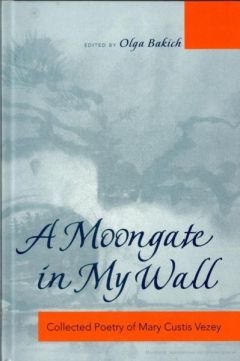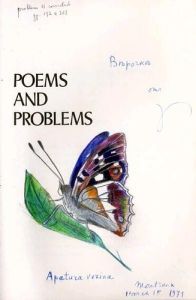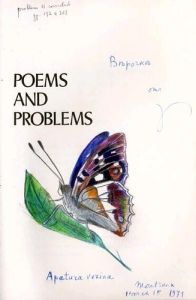Мария Визи - A moongate in my wall: собрание стихотворений
July 1967
617. Дмитрий Кленовский (1893–1976). «Легкокрылым гением ведомы…»[278]
Guided by some lightly winging spirit
far beyond the sea the birds have flown.
On this dark and bleak November morning,
why do you and I stay home alone?
Maybe we should follow — take a knapsack,
staff and flask, some good and trusted books,
and pursue the swiftly flying swallows
over woods and meadowlands and brooks?
Only those who linger are un able
to partake of joys on Earth arrayed.
Every turnpike, boundary and barrier
we would pass, unseen and unafraid.
Surely then, at break of day tomorrow
you and I would reach the rosy haze
over gleaming rocks and crested breakers,
slender palms, and golden blessed days!
And as surely, to the fullest measure,
we who dared would be repaid indeed
for the grain of utter faith within us,
for that single mustard seed!
[1960s]
618. Дмитрий Кленовский (1893–1976). Царскосельские стихи[279]
When I was a boy I used to be your friend,
beautiful town of parks and lonely statues,
dense lilac groves and empty palaces, —
you hadn't yet been visited by grief.
Your Gumileff was still a carefree youth,
Akhmatova — a schoolgirl and in love,
and Innokenti Annensky had not
died suffocating at your railroad station;
even your Pushkin used to seem to me
not dead, but living, not yet grown up,
but just another of my noisy classmates.
Decades have passed. Impossible to count
your losses. All your palaces now lie
decaying. All your poets have been killed
by silence, bullet, or complete contempt.
Alone the name of Pushkin, as of old,
still shines above you like a glorious promise
— a token of the coming future truth.
[1960s]
619. Дмитрий Кленовский (1893–1976). «Как много есть прекрасного на свете…»[280]
There s such a wealth of beauty in the world:
a maiden’s breast, a flying eagle's wing,
loaf of a maple, sunrise in Rialto,
a lily-of-the-valley in the spring;
a leaping doe; the Milky Way, a sail,
the Volga's great expanse, a child's eyes…
You see yourself: too many things to mention
for you and me to count or to surmise.
And yet is life not easier for knowing
that everywhere around you children roam,
and maples grow, and there are waves, and maidens,
or simply someone's garden and a home?
You say to me: All that is transient, passing!
But you are wrong! Next spring, in that green bower,
another doe will leap again, as lightly,
and underfoot will bloom another flower!
Our world is ill. It whispers invocations
and tries to smother what in life is true.
But nowhere in it stands a ruined building
where grass will not come up anew.
[1960s]
620. Дмитрий Кленовский (1893–1976). «He камешком в мозаиках Равенны…»[281]
No pebble in ravenna's sculptured tomb,
nor crimson paint-dab in the Vatican, —
I merely was a wisp of merry spume
upon the ocean's blue and distant span.
But when a sail came toward me, I would swirl
to meet it; I have played with reefs near land,
caressed the body of a sun-tanned girl,
and, tired, dug into the golden sand.
My fleeting course no great event did jar;
for one chance moment was my fate unfurled,
yet I was happier and richer far
than all the tombs and castles of the world.
[1960s]
621. Дмитрий Кленовский (1893–1976). «Высох ключ, струившийся в овраге…»[282]
Dry the source that ran in the ravine.
Hot the noon. But take a look again:
in the hollow stump, some moisture still —
fusty water left there by the rain.
Playing with your twig — be very careful
not ot splash it out around the brink —
even though it's pitifully scanty,
someone still may need it for a drink!
After dawn tomorrow some small creature —
squirrel, hedgehog — may come by this rill
and may drink. You too — who knows what happens? —
yet may taste it in a final thrill.
[1960s]
622. Дмитрий Кленовский (1893–1976). «Прощаться всего трудней, потому…»[283]
It's hardest of all to say goodbye,
it is best to be alone to die.
For no one at all to be near, instead
just an empty room, a chair, a bed,
not to see anyone sadly weep,
not to have any small dog creep
from under your bed to lick your cheek,
or a sun ray come through a crack and peek,
or a butterfly dart in the window So
may it not be spring when I have to go!
May I die in the night! When a single star
may fall… and another… again… How far
easier, maybe, to go away
down such an
utterly
empty
way.
[1960s]
623. Дмитрий Кленовский (1893–1976). «Я растерял их по пути…»[284]
I lost them all along the way,
those words 1 failed to clothe in sound.
Like swallows on a winter day,
never again can they be found.
I didn't show them much concern,
so they departed, taking wing.
And yet perhaps they will return
to others, in some future spring?
[1960s]
624. Дмитрий Кленовский (1893–1976). В комнате умершего[285]
Yes, now it's empty here… His silhouette is gone,
it isn't at the desk, nor in the easy-chair.
I his stillness! And the thought that he is here no more
How can you justify, how can you call it fair?
And yet — don't weep! And leave this vacant room!
Go down the stairs, stand by the window-pane,
look hard into the fading blue of dawn.
You see — that's he, there, striding down the lane!
Don't try to call — you cannot bring him back!
But know: he lives, his life will never end.
He had been visiting, and has gone off once more.
Listen — he's singing! Far…around the bend.
[1960s]
625. Довид Кнут (1900–1955). Я не умру и разве может быть[286]
I shall not die. Nor can it be, I know,
that earth without me in the gladsome space
would draw its thread of fire and ever go
along its senseless and its joyful race.
It cannot be that after I am gone
the earth would blossom, wilt, and roll ahead
among the worlds, that trees would rustle on,
that snow would circle, after I was dead!
It cannot happen. I assure you. I
will stubbornly continue on my course,
and when the awful hour has come to die
will push the coffin's lid with all my force,
and I will shout: I do not want it so!
I need to feel this gladness that is blind!
Shoulder to shoulder with my sweet to go!
To give the sun whatever name I find!
No in a stuffy box you cannot lay
one who has spurned all
I want to live, and I shall live, I say
and…
[1960s]
626. Довид Кнут (1900–1955). «Пусть жизнь становится мутней и непролазней…»[287]
Let life grow dimmer, harder every day,
let work become more vain, more useless, let
men we can speak to seldom come our way,
I thank You for the right of living yet.
And let the years…
Indeed it is but nothing that one pays:
a tear and sigh — for fields, for songs afar,
for cherished voices, for a brother's gaze,
and for the air of this rejoicing star.
[1960s]
627. Михаил Лермонтов (1814–1841). Утес
Once a golden cloudlet spent the night
on a giant cliff's great rugged breast;
than at daybreak speeded on its quest,
gaily playing in the azure light.
But a spot of moisture lingered, traced
in a wrinkle on the ancient stone;
lost in thought, the giant stands alone,
weeping softly in his barren waste.
10 Jan. 1961
628. Юрий Мандельштам (1908–1943). «Еще я беспокойнее иного…»
То V. Smolensky
I am more restless than another still, —
a word that's said with casual caress,
a furtive glance — still send through me a thrill,
alike a tender glance or vivid dress.
And even yet to me it is a pleasure
to… a fancy, strange and far away
to suffer from a rime, at times to measure
emotion, caught by chance upon the way
But every day the soul does stricter get,
obeys the ray that moves not, and I feel
that I will teach that same emotion yet,
though that same rime to be of sadless zeal
And soon, I know, — thanks to the God who takes
us onward with a wisdom-guided palm, —
we will exchange anxiety that aches
for heavenly and light-abounding calm.
11 June 1930
629. Юрий Мандельштам (1908–1943). «К чему стихи? Уже и так от них…»
More verse? What for? Already from their curse
the soul is sad, as unsuccessful verse.
Already, when I barely close my eyes —
comparisons to you before me rise.
You are w o ndrous than a rose, and, too,
more tender than my tenderness for you,
or you are sad, a drooping willow tree,
or toiling, as a love-abounding bee,
or else you dream — and in that mood you stay
to me more puzzling than a gloomy day.
Our life is plain, less visible by far:
and you are worse — yet better loved you are.
ca. 20 Aug. [1930]
630. Юрий Мандельштам (1908–1943). «За окном морозная луна…»
То Katherine Garon
Out-of-doors — the murky winter light,
frosty moon, and stillness of the night.
Hut your window has been covered long
with a screen, reliable and strong.
Out-of-doors, above the house and tower
fearful is the moon this chosen hour.
Yet you sleep, the moon you do not heed:
you are dreaming other dreams indeed.
Out-of doors, beneath the moonlight glow,
stubborn guard, I wander to and fro.
But it is not joys of love that fill
your illusions in the midnight still.
[1930]




